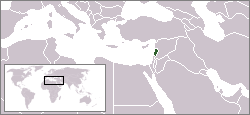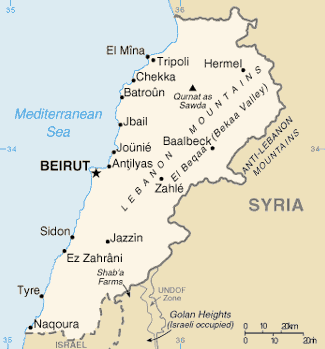Lebanon
The Lebanese Republic or Lebanon is a country in Southwest Asia, bordering the Mediterranean Sea. It is considered to be one of the fifteen present-day countries that comprise the "Cradle of Humanity." Lebanon is bordered by Syria and Israel.
| |||||
| National motto: n/a | |||||

| |||||
| Official language | Arabic | ||||
| Spoken languages | Arabic, French, English, Armenian | ||||
| Capital | Beirut | ||||
| President | Émile Lahoud | ||||
| Prime Minister | Omar Karami | ||||
| Area - Total - % water |
Ranked 160th 10,452 km² 1.6% | ||||
| Population | Ranked 123rd
| ||||
| Independence | 22 November 1943 | ||||
| Currency | Lebanese pound (LBP) | ||||
| Time zone | UTC +2 (DST +3) | ||||
| National anthem | Koullouna Lilouataan Lil Oula Lil Alam | ||||
| Internet TLD | .lb | ||||
| Calling Code | 961 | ||||
History
Lebanon is the historic home of the Phoenicians, Semitic traders whose maritime culture flourished there for more than 2,000 years. The region was a territory of the Roman Empire and during the Middle Ages was involved in the Crusades. It was then taken by the Ottoman Empire.
Following the collapse of the Ottoman Empire after World War I, the League of Nations mandated the five provinces that make up present-day Lebanon to France. Modern Lebanon's constitution, drawn up in 1926, specified a balance of political power between the various religious groups.
The country gained independence in 1943, and French troops withdrew in 1946. Lebanon's history from independence has been marked by alternating periods of political stability and turmoil interspersed with prosperity built on Beirut's position as a regional center for finance and trade. Beirut was called the Paris of the Middle East, until the outbreak of the Lebanese Civil War.
After the 1948 Arab-Israeli conflict, Lebanon became home to more than 110,000 Palestinian refugees who had fled from Israel. More Palestinian refugees arrived in Lebanon after the 1967 Arab-Israeli war and Black September, and by 1975, they numbered more than 300,000, led by Yassir Arafat's Palestine Liberation Organization. In the early 1970s, difficulties arose over the presence of Palestinian refugees, and full-scale civil war broke out in April 1975.
Israel invaded Lebanon in March 1978. Israeli forces withdrew later that year in response to UN pressures. Attacks against Israeli territory increased, however, as the PLO's armed forces used Lebanon as a base to attack Israel with rockets and artillery. Due to ongoing civil war since 1975, Lebanon had no effective central government at the time.
In 1982, Israel launched a major attack over Lebanon, where it occupied areas from the south to Beirut. The Sabra and Shatila massacre was commited by the Phalangist militia (under the command of Elie Hobeika) while the Israeli army guarded the entrances.
A multinational force landed in Beirut on August 20, 1982 to oversee the PLO withdrawal from Lebanon and U.S. mediation resulted in the evacuation of Syrian troops and PLO fighters from Beirut. This period saw the rise of radicalism amongst the country's different factions. In 1982 Hezbollah was created by some of the old members of Amal with other religious clerics.
The Taif Agreement of 1989 marked the beginning of the end of the war. In all, it is estimated that more than 100,000 were killed, and another 100,000 handicapped by injuries, during Lebanon's 16 year war. On May 22 2000, Israel completed its withdrawal from the south of Lebanon in accordance with UN Security Council Resolution 425. On October 19 2004, the UN Security Council voted unanimously to put out a statement calling on Syria to pull its troops out of Lebanon.
Much of the civil war damage has now been repaired throughout the country, and many foreign investors and tourists have returned. Lebanese civil society generally enjoys significantly more freedoms than elsewhere in the Arab world. However, there are continuing sectarian tensions and Syrian presence and other external influences.
Politics
Lebanon has a unique form of parliamentary democracy in which the highest offices are reserved for certain ethnic groups. The constitution grants the people the right to change their government. However, from the mid-1970s until the parliamentary elections in 1992, civil war precluded the exercise of political rights. According to the constitution, direct elections must be held for the parliament every 4 years. The last parliament election was in 2000. Parliament, in turn, elects a president every 6 years to a single term. The President is not eligible for re-election.
This constitutional rule has been amended twice in recent history, at the urging of the Syrian government.
The last presidential election was in 1998. The president and parliament choose the prime minister. Political parties may be formed. However, most are based on sectarian interests. Freedom of speech has thus been curbed and the president must have Syrian backing in order to be in power.
Lebanon's judicial system is based on the Napoleonic Code. Juries are not used in trials. The Lebanese court system has three levels--courts of first instance, courts of appeal, and the court of cassation. There also is a system of religious courts having jurisdiction over personal status matters within their own communities, e.g., rules on such matters as marriage, divorce, and inheritance.
Many Lebanese are unhappy with the undue influence exerted by the Syrian government over their affairs.
Governorates
Lebanon is divided into 7 governorates (mohafazat, singular - mohafazah). Each governorate has several counties.
Geography

A Middle Eastern country, Lebanon is demarcated to the west by the Mediterranean (Coast: 225 kilometres) and to the east by the Syro-African Depression. Lebanon borders Syria for 375 kilometres to the north and to the west and Israel for 79 kilometres to the south. The border with Israel has been approved by the United Nations, although a small piece of land called "Shebaa farms" located in the Golan Heights is still occupied by Israel, who claims that it is actually Syrian land. The UN has officially declared this land to not be Lebanese territory, however. The Lebanese resistance claims "Shebaa farms" as Lebanese land and occasionally launches attacks against Israeli positions within it. In addition, Syria maintains an army of approximately 17,000 troops in Lebanon. Lebanese supporters of Syria claim this is a legitimate presence as it was requested by the Lebanese government at the outset of the civil war in 1975. Opponents of Syria, and the international community claim the Syrian presence is a hostile occupation by a foreign power.
Economy
Lebanon has a competitive and free market regime and a strong laissez-faire commercial tradition. The Lebanese economy is service-oriented; main growth sectors include banking and tourism. There are no restrictions on foreign exchange or capital movement, and bank secrecy is strictly enforced. Lebanon has recently adopted a law to combat money laundering. There are practically no restrictions on foreign investment.
The 1975-1991 civil war seriously damaged Lebanon's economic infrastructure, cut national output by half, and all but ended Lebanon's position as a Middle Eastern entrepot and banking hub. Peace has enabled the central government to restore control in Beirut, begin collecting taxes, and regain access to key port and government facilities. Economic recovery has been helped by a financially sound banking system and resilient small- and medium-scale manufacturers, with family remittances, banking services, manufactured and farm exports, and international aid as the main sources of foreign exchange.
Demographics
The population of Lebanon comprises different ethnic groups and religions: Christians (mainly West Aramean/Syriac but some Armenian), Muslims (Sunnis and Shi'ites), Druze, and others. No official census has been taken since 1932, reflecting the political sensitivity in Lebanon over religious balance. Current estimates say that 47 to 50 percent of the resident population is Christian; the rest is Muslim and Druze. Lebanese Christians are predominantly Maronite, Greek Orthodox, Greek Catholic, Armenian Orthodox, and Armenian Catholic. There are minorities of Protestants, Syriacs and Chaldeans. Small communities of Jews (mostly living outside Lebanon) and Kurds exist as well. There are 20 million Lebanese spread all over the world, predominantly christian.
Culture
An infamous yet amazingly true statistic by the Ministry of Transportation cites an enormously large number of casualties due to automobile accidents, an average of 5,013 per year (Lebanese Ministry of Transportation).swlooooooooooooooooooool
See also
- Prominent Lebanese people
- Communications in Lebanon
- Counties of Lebanon
- Transportation in Lebanon
- Military of Lebanon
- Foreign relations of Lebanon
- Military action in Lebanon
References
- CIA World Factbook 2000 [1] and the 2002 U.S. Department of State website. Partially wikified.
- Encarta Lebanon profile
Movies/Documentary
External links
- Al Mashriq - the Levant
- Arab Gateway - Lebanon
- CIA World Factbook - Lebanon
- Destination Lebanon
- Library of Congress Country Study - Lebanon
- LookSmart - Lebanon directory category
- Open Directory Project - Lebanon directory category
- Lebanon.com online resources
- Rediscover Lebanon
- Souwar.com picture gallery
- The Daily Star - Lebanon
- Yahoo! - Lebanon directory category
- Yahoo! News Full Coverage - Lebanon news headline links


